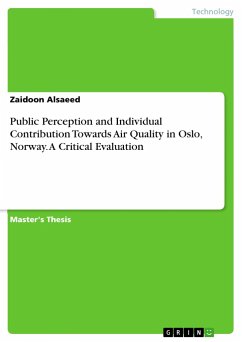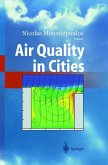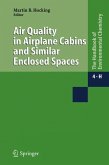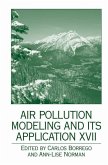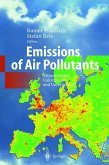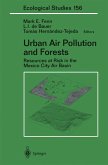Master's Thesis from the year 2014 in the subject Environmental Sciences, grade: Distinction, University of Sunderland (University of Sunderland, Faculty of Applied Science), course: Master Program in Environment, Health and Safety, language: English, abstract: There is a current attention is paying to air quality management in Oslo. This attention appeared in the plan for improving air quality in Oslo, which is passed in 2005 and revised in 2010, on short and long term. To meet the objectives of this plan, public consultation is necessary for the local authorities. Decision makers depend heavily on medical and scientific information, which is uncertain. Therefore, this project examined the perception of Oslo residents towards air quality, and the impacts of air pollution on their lives, health and behaviors. In doing so, people's concerns and their awareness towards air pollution was evaluated as well as the way they perceive the effects of air pollution on their daily outdoor activities. Public behavior was also investigated in order to evaluate their contribution to the issue of air pollution. The research employs quantitative technique by using questionnaire survey which is analyzed by using statistical methods. The questionnaire is directed to the residents of Oslo in four different areas in the city (Gamle Oslo, Sofienberg, Oslo Sentrum and Frogner area). The four areas were chosen due to their high population density and as well as due to their high pollution levels, which sometimes during winter exceed the National Air Quality Strategy Standards for PM10 and NO2. The results of this project have shown high level of concerns towards air pollution among the residents, and those who showed the highest concerns by the socio-demographic factors were women, young people and those of high level education (university and college). Also, high per cent of the participants showed good knowledge about the major sources of air pollution in their city. High per cent indicated that there are no breathing health effects of air pollution on them while walking, and almost half of the sample indicated that there are some breathing health effects on them while jogging and cycling. Regarding the environmental behavior, people have shown high willingness to improve their behavior. However, converting from willingness mode to act mode is requiring some compromises such as improving and reducing costs of public transportation and increase cycling lanes in the city. Reduction the high costs of electric cars is also another motivation to improve people's behavior, which they consider unaffordable in spite of the initiatives that are adopted by Oslo government to make them more appealing.
Hinweis: Dieser Artikel kann nur an eine deutsche Lieferadresse ausgeliefert werden.
Hinweis: Dieser Artikel kann nur an eine deutsche Lieferadresse ausgeliefert werden.

